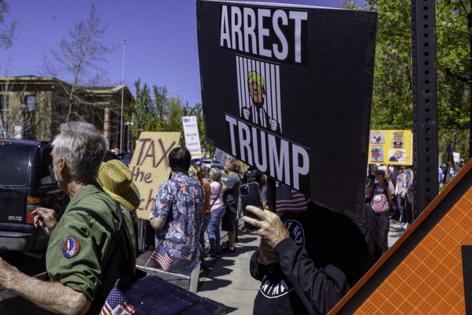Commentary: Want to do something about polarized society? Stop shouting slogans
Published in Op Eds
We have all seen and experienced the intense polarization in today’s society. It is everywhere around us. People seem less and less able to communicate with those on the other end of the political spectrum. Our disagreements go deep, and it is easy to lose patience with others. We can get angry quickly and find ourselves getting defensive in conversations … in person or online. I have lost friends over the last couple of years, and you may have as well. What can we do to make things better?
It’s not hard to think of examples of the kind of speech that contributes to polarization. If we look at the right end of the political spectrum, we encounter words like woke, DEI or anti-American. People who use these words have something in mind, but it isn’t clear what that is. What is woke? It seems to be nothing more than a catch-all phrase for anything someone on the right despises. And DEI? Same thing. What does it mean for someone to be anti-American? Is someone anti-American if he or she condemns the president or takes a knee during the national anthem? Isn’t freedom of speech a constitutional right?
And there are real problems with language use on the left end of the political spectrum. Words like colonialism, imperialism or white privilege might mean something to some who use them. Still, for many people, they are just words used to accuse others of doing something of which they disapprove. Like the slogans of the political right, the main thing they do is create defensiveness and anger.
Why is the way we use language important? Why does any of this matter? George Orwell — the author of the novel “1984” — also wrote a brilliant essay, “Politics and the English Language.” In it, he discusses how using vague language can, over time, degrade our ability to think clearly. If we speak in political slogans, we will get to the point where we can only think in political slogans. And when we get to that point, it becomes impossible for us to disagree meaningfully and civilly. Speaking in political slogans makes honest communication difficult, if not impossible.
There is no quick fix to the problems our society is facing because these issues are not just about semantics. This is definitely a time to face our challenges courageously and directly. However, we can address issues more directly by adopting a simple rule: Don’t use vague, meaningless words and phrases when talking to others. Be precise when you speak. In other words, be sure you know the meanings of the words you use and be open to the possibility that someone else can enhance your understanding of them.
Political speech is often unclear, but in the last few years, the vagueness and imprecision of our speech have reached new heights. One reason for this is that many people don’t think before speaking. They string words or phrases together that they have picked up from others without really considering what the implications of their words really are. There is something more sinister at work. It also serves the interests of some political leaders to be intentionally obscure, to mask their intentions with vague words or phrases that sound innocuous enough, when, in fact, they can lead to disturbing consequences.
If we learn to use language clearly, we can dial back the anger that political slogans inspire. If we can speak to each other clearly and directly, we can find some solutions to our problems instead of creating more division in our society.
Orwell said the English language “becomes ugly and inaccurate because our thoughts are foolish, but the slovenliness of our language makes it easier for us to have foolish thoughts.” Our problems are real; they are not just a matter of poor communication, but poor communication can make things worse. Orwell argued that if we can use our words more carefully, we can think more clearly, and “to think more clearly is a necessary first step toward political regeneration: so, the fight against bad English is not frivolous.”
We can all make a difference. No one can change society alone, but we can all play an essential role in healing the political divide that defines us. One conversation at a time.
____
ABOUT THE WRITER
Solomon D. Stevens is the author of “Religion, Politics, and the Law” (co-authored with Peter Schotten) and “Challenges to Peace in the Middle East.” He wrote this for InsideSources.com.
___
©2025 Tribune Content Agency, LLC.




























































Comments